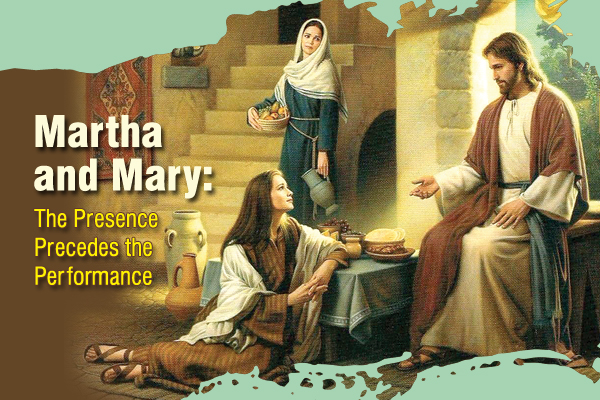Azadi ka Amrit Mahotsav Kolkata event honours four Clergymen
Pope Francis asks businesses to support working women: They’re ‘afraid to get pregnant’
Study: Christianity may lose majority, plurality status in U.S. by 2070
Indian politician declines Magsaysay Award under party pressure
Like John Paul II, Pope Francis heads to Kazakhstan during time of war


The Martha-Mary episode in the Gospel of Luke (10:38-42) has been always a matter of lively debate in the Christian thought. Whether Jesus commended the contemplative Mary and put down the activist Martha? Actually, wasn’t it Martha who welcomed Jesus at home and tried her level best to host him, the one to be appreciated than the “idle” Mary? Shouldn’t we try to have a happy blending of the action and contemplation in our Christian discipleship? A number of such questions are being raised by the reflective reading of this episode.
The Martha-Mary episode comes immediately after the great parable of the Good Samaritan (Lk 10:25-37) which exhorts to “go and do like this” and thus connotes an activist line in discipleship. Now, the Martha-Mary episode highlights not the mode of “doing” but the need of “being” in the presence of the Lord. By giving this episode immediately after the parable of the Good Samaritan, Luke was deliberately focusing on the question by a lawyer regarding eternal life. The observing of two commandments prescribed in the Law was pointed out as the means of obtaining eternal life here, “Thou shalt love the Lord thy God with all thy heart, and with all thy soul, and with all thy strength, and with all thy mind; and thy neighbour as thyself” (Lk 10:27). The story of the Good Samaritan and the Martha-Mary episode together form the practical application of these vital commandments – love of God and love of neighbour. By juxtaposing these two episodes together, Luke also emphasizes the thrust of his Gospel, namely, the Christian discipleship is a happy blending of contemplation and action. But there should be a proper discernment in forming the priorities.
In the incident, both of the sisters in Bethany offered hospitality to Jesus who was passing by, but in two different ways. Martha was absorbed herself in preparations in such a way that she was “distracted.” The Greek verb used for distraction is “perispaomai” which literally means, “to be drawn away.” Martha was drawn away from the unum necessarium – “one needful (necessary) thing” – being at the foot of the Lord.
On the other hand Mary was at peace in placing herself at the feet of the Lord in listening to his words. It was an act performed by the Jewish men disciples! She was not distracted neither by the preoccupation of the duties nor about the consequences of crossing the boundaries as a woman. She made a conscious decision to be in the presence of Jesus than worrying about the preparation of a meal for Him. This priority that she showed to be in the presence of the Lord than the performances in front of Him helped her to choose the better part.
Often it is interpreted that Martha was criticized by Jesus and this viewpoint paves the way for the misinterpretation that Jesus was always in favour of contemplative life style. But, a close reading of the text will reveal to us that Jesus was just pointing out to Martha the need of discerning the priorities in life and Mary has succeeded in choosing that “better part.” Martha was preoccupied with hospitality, while Mary gave full attention to the guest Himself. She loved the Lord “with all her heart, and with all her soul, and with all her strength, and with all her mind” without any distraction. Mary’s single-minded devotion to the Lord expressed through her presence at the feet of the Lord is applauded than Martha’s anxious toil.
Very often our spirituality which is to be centred on our experience of being in the presence of God is overshadowed by our religiosity which is centred on rituals and rubrics. We misunderstand spirituality as something we do in the name of God. The real essence of the spirituality – being in the presence of God and to have a harmonious relationship with Him and others without any distractions is often easily forsaken and many are carried away by the ritualistic expressions. It’s like throwing out the fleshy inner part of the banana and eating the peel!
When we pay more attention to doing, when we give more weight to objects, rituals, functions, structures, traditions and forget the centrality of Christ, when we do not reserve time for being in His presence, having dialogue with Him in prayer, we miss the mark of the real spiritual life. The performance oriented religion which is characterized by the megalomania, interest in grandeur, festivities, miracles, crowd pulling meetings etc is far away from helping us in choosing the “better part.” The “workaholic” worship may not provide us with the peace and joy of Christ. We need to learn to sit at the feet of Jesus, contemplate Him, and listen to Him with our hearts and to have dialogue with Him.
Leave a Comment